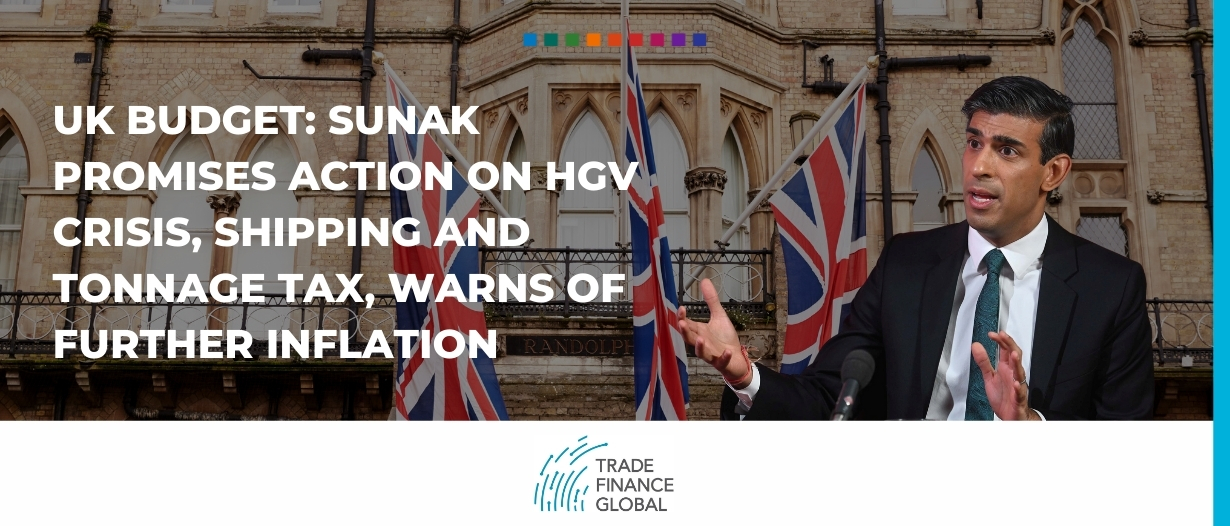British Chancellor Rishi Sunak today presented his Autumn Budget of 2021 to the UK House of Commons.
Among its key features for trade finance, Sunak promised action on the UK’s HGV crisis, and new changes in shipping and tonnage taxes.
He also warned of further inflation, however, which could put pressure on the UK’s post-COVID-19 recovery.
In his opening remarks, Sunak pointed out that inflation hit 3.1% in the UK in September, and is forecast to average at 4% over the next year, according to the Office for Budget Responsibility.
Sunak said “the majority” of the rise in inflation is the product of two global forces, both of which are beyond the control of the British government.
“First, as economies around the world re-open, demand for goods has increased more quickly than supply chains can meet,” said Sunak.
“Having been shut down for almost a year, it takes time for factories to scale up production, for container ships to move goods to where demand is, for businesses to hire the people they need.
“And second, global demand for energy has surged – at a time when supplies have already been disrupted, putting a strain on prices.”
In the year to September, Sunak said that the global wholesale price of oil, coal, and gas combined has more than doubled.
“It’s clear these are shared global problems, neither unique to the UK nor possible for us to address on our own,” he said, emphasising that the country’s supply chain issues will take “months to ease.”
HGV driver shortage
One area in which Sunak did have concrete solutions to offer was that of heavy goods vehicles (HGVs).
The centrepiece of Sunak’s comments on HGVs was his announcement that the HGV levy – already suspended until August 2022 – will be suspended until 2023, and that vehicle excise duty for HGVs will also be frozen.
To further tackle the UK’s HGV driver shortage, Sunak also said that Transport Secretary Grant Shapps will be introducing new temporary visas for drivers and will expedite the country’s testing backlog for new drivers.
In addition, the UK will modify its cabotage requirements, and will introduce new funding to improve lorry park facilities.
Shipping and tonnage tax
On shipping and tonnage tax, Sunak said that a “simpler, fairer” system is on its way, now that the UK has left the European Union (EU).
“We want this country to be the most exciting and dynamic place in the world for business, and now that we’ve left the EU, we have the freedom to do things differently,” he said.
“I want to begin with one of our smallest taxes, but a tax which plays an important role in one of our pre-eminent industries: shipping.”
Sunak said that, from today, the UK will embark on reforms to its tonnage tax regime that will make it more competitive, and fairer for British taxpayers.
“When we were in the old EU system, ships in the tonnage tax regime were required to fly the flag of an EU state,” he said.
“But that doesn’t make sense for an independent nation, so I can announce today that our tonnage tax will – for the first time ever – reward companies for adopting the UK merchant shipping flag: the Red Ensign.
“That is entirely fitting for a country with such a proud maritime history as ours.”

Green finance
Finally, Sunak celebrated the UK’s status as a world-leading centre for green finance, and outlined further green investments included in his budget.
A total of £30 billion is earmarked for investments in new green industries, he said, which is part of the UK government’s net zero by 2050 strategy.
Sunak also noted that the UK issued its second green bond this week – known as ‘Green Gilt’ – which will help raise a further £6 billion for green projects, in addition to the £10 billion already raised by the sale of the first bond last month.
The sale of the second bond, Sunak claimed, makes the UK the third largest issuer of sovereign green bonds in the world.
Last week, London was named as the world’s best place for green finance in the Z/Yen Group’s global rankings survey.
And on Monday this week, the newly launched UK Infrastructure Bank announced its first ever investment: £107 million to support offshore wind in Teesside in the north of England.
Sunak concluded by saying that, in a week from today, he intends to build on the UK’s green achievements when he hosts global finance ministers at the United Nations Climate Change Conference, COP 26, in Glasgow, Scotland.





























